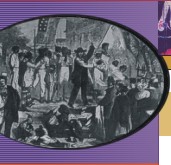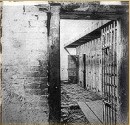



-Abraham Lincoln |
 |
La. Slaves sailed away to freedom
200 were taken to Nova ScotiaBy Joan Treadway
Staff Writer
Wednesday January 8, 1997 The Times Picayune

The great Cajun odyssey that brought Acadians from Canada to Louisiana in the 1700's is well documented.
Relatively unknown until now is a reverse migration through which a group of about 200 slaves ended up in Nova Scotia after the British liberated them from Louisiana plantations in the final stages of the War of 1812.
"It seems that fate, luck and benevolence by the British all conspired to assist in the plight of these bondsmen, who sailed away from Louisiana with the British Fleet in March 1815, " said Edna Jordan Smith, the founder of the Afro-Louisiana Historical and Genealogical Society and the discoverer of this little-known chapter in black history.
American forces under the command of Gen. Andrew Jackson won the Battle of New Orleans 182 years ago today. A treaty had been signed in Belgium 15 days before the battle, but word that the War of 1812 was over had not reached the South.
History professor Joseph Logsdon of the University of New Orleans said of Smith's find, "It's a major discovery and only shows the lack of attention to the presence of black people in major events of American history."
Smith said she got her first hint of the episode about five years ago at a convention of genealogists in Washington, D.C. A participant told her of a woman in Nova Scotia who claimed one of her ancestors had been a New Orleans area slave, brought to Canada and freedom around the time of the War of 1812.
Last year, Smith began focusing on the possibility of such a link. Officials at the Black Cultural Centre for Nova Scotia told her "that some slaves had come from the New Orleans area during that war, but they didn't know the actual number," she said.
About three months ago, after a fruitless search of some historic collections in New Orleans, Smith found references to the incident and a precise number right under her nose: in the stacks of the Bluebonnet library in Baton Rouge, where she works. The key document: a memoir of the war by Maj. A. LaCarriere Latour, a principal engineer in the American Army during that period.
Included in the memoir is a list of 22 New Orleans area planters of that time along with the number of slaves taken from each of them.
Latour said he was referring to "the negroes taken from the shores of the Mississippi by the British, whom they refused to surrender, under the pretext of considering them as deserters."
In an appendix, there is a letter dated March 7, 1815, from Jackson to British Maj. Gen. John Lambert saying that Jackson had given permission to several of these planters to go out in a schooner to the British fleet "for the purpose of seeing and reclaiming their slaves."
A letter from Lambert to Jackson dated Feb. 8 suggest that the British were willing to relinquish the slaves to their former owners, but that the slaves had no desire to return to bondage: "What I said respecting the slaves regards those that I could not prevent coming to us when I was on shore," Lambert wrote. "I did all I could to persuade them to return at the time, but not one was willing."
Latour stated that during their campaign to take New Orleans, which began in December 1814, the British made several excursions into local settlements and "carried off the negroes of the plantations they had occupied." He said some were willing to follow, but a larger number were removed forcibly by the British.
Smith is skeptical of that account. She believes that all the slaves were willing to leave and things that Latour got an inaccurate view from the planters. The slaves would have had strong incentive to leave: at that time, the British were ahead of the Americans in having ended the slave trade throughout their empire, although slavery persisted in some colonies.
Smith believes that all 199 former slaves listed as "taken" by Latour ended up in Nova Scotia, because that's where the fleet went when it left and any detours were unlikely.
She plans further research at the Library of Congress and will lead a historical tour from New Orleans to Nova Scotia in July.
A publication of the Black Cultural Centre for Nova Scotia said that a total of about 2,000 black refugees from America came to that part of Canada at the time of the War of 1812, and that earlier, at the close of the American Revolution, about 3,500 black people fled to what is now Nova Scotia and New Brunswick.
Judith Schafer, who teaches history at Tulane University and Tulane Law School and who has written a book on slavery, said slaves often took advantage of periods of confusion, such as war, to escape. Even without war as a backdrop, rebelliousness was evident among Louisiana slaves. Schafer cites an insurrection of about 500 slaves upriver from New Orleans in 1811, the largest slave revolt in U.S. history.
"I think they'd consider it pretty safe to be going away with the British," she said of the slaves involved in Smith's discovery.
Clyde Robertson, director of the New Orleans public schools' Africana studies and culture unit, said it was an act of courage for people who had been enslaved to depart with foreigners for an unfamiliar destination.
Contact Us | Homepage